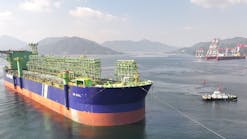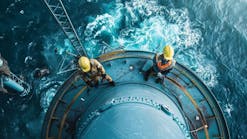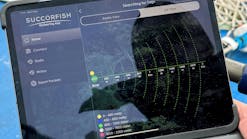Deepwater excavation experts at Aberdeen's PSL Energy Services have been called in to assist recovery operations after Hurricane Ivan wreaked havoc in the Gulf of Mexico and a blow out destroyed a major platform offshore Egypt.
The oil and gas services specialist will carry out seabed excavation services at the site of Taylor Energy's Mississippi Canyon block 20 platform, offshore Louisiana, which was forced on to its side when mudslides swept down the Mississippi Delta in the aftermath of Ivan.
The site of the platform is now buried in up to 40 ft of mud and PSL engineers will use industry-leading technology to unearth the conductor area where the platform formerly stood. PSL will use their remote Jet Prop tools to carry out dredging at Mississippi Canyon block 20 in a £240,000 contract.
The US Department of the Interior's Minerals Management Service reported Hurricane Ivan resulted in the destruction of seven platforms. Six platforms and five drilling rigs also suffered major damage and the damage led to shut-in oil production equivalent to 11.5% of the GoM's daily oil production.
JetProp 75 series will be used to direct low pressure with high volume columns of water to clear the overlying mud and allow diver and ROV access to the wells.
Engineers from the PSL's Portlethen-based firm have also been involved in vital excavation operations after pipelines supplying the majority of Jordan's gas supplies required major subsea intervention.
The Temsah natural gas platform, 60 km offshore Port Said in Egypt, was destroyed in a fire following well control problems and a subsequent blowout. The incident resulted in the total loss of field production and service pipelines from the adjacent Akhen platform had to be shutdown.
The Temsah deepwater field is believed to supply up to 70% of Jordan's total gas supply. As a result, an emergency operation to resume production by installing new pipeline sections to bypass the Temsah platform swung into action.
PSL's excavation team was commissioned by Subsea 7 to unearth production and condensate gas export pipelines on behalf of Egyptian subsea contractor Petroleum Marine Services.
A hydraulically-driven subsea excavation tool was used to direct a low-pressure, high volume flow of water vertically downwards at the seabed, dispersing soils around the pipelines, allowing diver access to tie-in new sections of pipeline.
Excavation works were controlled by way of Seabat Sonar – a real time multibeam sonar that can control excavation of pipelines to a tolerance of just 5 cm.
PSL's pipelines and excavations operations manager Tom Hasler said the company had been called in to lead the difficult project because of their vast experience in conducting similar work across the world.
01-10-05




